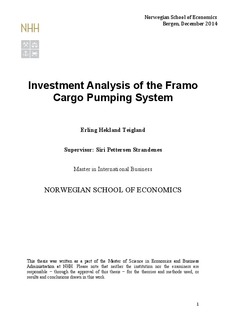| dc.description.abstract | This paper looks into whether or not it can be profitable for a shipping company operating in
the product tanker segment, to change from a steam driven cargo pumping system to a
hydraulic cargo pumping system by Frank Mohn AS. By looking at two triangulation
scenarios, one between the U.S. and Europe transporting dirty products and the other between
the U.S. and Asia transporting both dirty and clean products, I have been able to show that
there are both market factors such as economical, political and technological, as well as the
vessel speed and bunker price influencing the profitability for the different route alternatives.
In order to make the results as realistic as possible, I have used three different variables;
vessel speed, bunkers price, and investment cost. The methods used to estimate whether the
investment is sound or not, is the discounted cash flow (DCF) model and the adjusted present
value (APV) model. In addition to the main scenarios, I have also looked at the profitability of
the first route, without the use of triangulation, in order to find out whether the use of
triangulation is an important factor for the profitability of the pumping system. I have also
looked into which factors that might impede on the trade for the two triangulation routes in
the future, by use of the PESTLE analysis.
The two analyses show that the new cargo pumping system will be profitable with the use of
triangulation and the competitive advantage of quite easily switching from dirty to clean
cargo. There are however some market conditions one have to keep in mind; for the first
route, it is important to not forget that the U.S. are getting less dependent on foreign oil, as a
result of their own increasing production. For the second route, one have to keep in mind the
changing economical and political situations in the concerned countries. With these
conditions in mind, one would be hard pressed to not see the potential profit from the new
cargo pumping system. | nb_NO |
